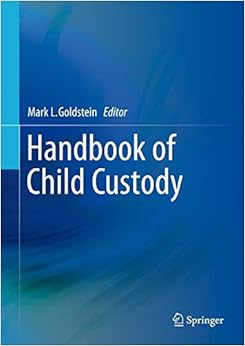Jeremy
D. Morley
I was pleased that authors Audrey G. Masilla and
Kristine M. Jacquin, in their chapter entitled “Relocation Evaluations in Child
Custody Disputes” in the newly-published Handbook
of Child Custody (Mark L. Goldstein, editor) relied substantially, when
discussing international relocations, on my prior article on the topic. My article, entitled “The Impact of Foreign
Law on Child Custody Determinations, is available here.
In the portion available of their work freely
available online,
the authors stated:
“Because
of the complex nature of foreign relocation, and what will and will not be
recognized in U.S. courts, Morley asserts that when foreign relocation is
probable, it is essential for those forensic psychologists conducting
relocation evaluations to be knowledgeable and take into consideration whether
the country under question recognizes and enforces U.S. custody
agreements. This knowledge pertaining to
U.S. law for relocations to foreign countries is vital in order to maintain the
safety of and reduce the potential consequences for both the child and the
left-behind parent. However, regardless
of whether the forensic psychologist and/or the U.S. court system is cognizant
and knowledgeable to the applicability of the U.S. custody determinations in
foreign locations, it is impossible to evaluate the true risk to the child (or
left-behind parent) or the potential experiences that may take place until he
or she is residing in the country of request.
Nevertheless,
Morley suggests that various elements usually included within a foreign custody
relocation agreement include a specified date of return that is nonnegotiable
without written approval via the left-behind parent, posted bond (e.g., money)
to ensure compliance with the U.S. custody order, and acquisition of a mirror
order (e.g., mirror order from foreign country) in advance and at the expense
of the parent requesting movement of the child.
When dealing with mirror orders, (1) the verbiage used in the order may
not transfer meaning accurately across cultures, (2) the receiving country may
not uphold the order, (3) the order can be modified by the resident of that
particular country, and (4) not all countries will provide a mirror order.
While
international relocation evaluations maintain a multitude of intricacies and
complexities necessary to navigate, Morley provides recommendations for custody
evaluators that deal with such international relocation evaluations, which
include being cognizant of the varying laws between foreign countries
pertaining to client-specific factors, determining if the country of relocation
is in collaboration of the Hague Abduction Convention, acknowledging that
foreign countries may not uphold a U.S. custody order, consulting with an
expert in international family law, providing safeguards for travel and visits
to foreign lands, recommending a mirror order (if possible), and, if the
determined relocation is that the child not relocate, providing recommendations
for safeguarding the denial situation (see Morley 2013 for full list regarding
international visitation and relocation).”



